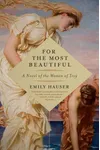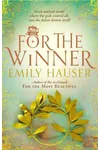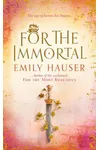Picture a British storyteller who weaves ancient myths into vibrant, modern tales—meet Emily Hauser! A classicist and novelist, Hauser has enchanted readers with her Golden Apple Trilogy, reimagining Greek legends through the eyes of women. With degrees from Cambridge and Yale, she blends scholarly precision with gripping storytelling, making antiquity feel thrillingly alive.
Currently a junior fellow at Harvard’s Society of Fellows, Hauser’s work bridges the gap between dusty tomes and page-turning fiction. Her passion for uncovering the untold stories of women in myth has earned her acclaim, drawing comparisons to authors like Madeline Miller and Natalie Haynes. Ready to dive into her world? Let’s explore the life and legacy of this award-winning author!
The Making of Emily Hauser
Born in Brighton, England, in 1987 or 1988, Emily Hauser grew up in Suffolk, where her love for classics sparked early. At age 11, she began studying Greek at Orwell Park School, a foundation that would shape her future. She honed her craft at Cambridge’s Gonville and Caius College, mentored by the renowned Mary Beard, earning a BA in 2009. Her academic journey continued with a Fulbright Scholarship at Harvard and a PhD from Yale in 2017, where her thesis explored women in classical literature.
Hauser’s transition to fiction was a natural evolution. Inspired by the male-dominated narratives of Homer’s Iliad, she sought to amplify the voices of women often sidelined in myth. Her rigorous scholarship and vivid imagination set the stage for her debut, launching her as a rising star in historical fiction.
Emily Hauser’s Unforgettable Stories
Hauser’s Golden Apple Trilogy is her crowning achievement, retelling Greek myths with a feminist lens. The first novel, For the Most Beautiful (2016), reimagines the Trojan War through Briseis and Krisayis, two women caught in the conflict’s chaos. The title nods to the Apple of Discord, the mythic catalyst for war, and Hauser’s meticulous research brings Troy to life with vivid detail.
The second book, For the Winner (2017), follows Atalanta, a fierce huntress who joins Jason and the Argonauts. Disguised as a man, Atalanta’s quest for the Golden Fleece explores themes of identity and leadership, earning praise for its feminist undertones. The trilogy concludes with For the Immortal (2018), focusing on Admete and Hippolyta, queen of the Amazons. This novel weaves Hercules’ labors into a tale of resilience, with Hauser’s emotional depth shining through.
Her style blends scholarly accuracy with accessible prose, making myths feel intimate and urgent. The gods, portrayed with human frailties, add humor and tension, while her focus on female agency resonates with modern readers. Hauser’s upcoming book, Mythica: A New History of Homer’s World (April 2025), promises to further illuminate the women behind these epic tales.
Why Emily Hauser Matters
Emily Hauser’s work has redefined how we engage with Greek mythology. By centering women’s voices, she challenges centuries-old narratives, offering fresh perspectives on timeless stories. Her trilogy has inspired readers to revisit classics like the Iliad, sparking conversations about gender and power in ancient and modern contexts. Featured on BBC Radio 4’s Woman’s Hour and lauded by The Telegraph, Hauser’s influence extends beyond fiction into classrooms, where she teaches and advocates for inclusive classical studies.
Her ability to make ancient worlds accessible has drawn a diverse readership, from mythology buffs to casual fans of historical fiction. As a scholar and storyteller, Hauser continues to shape the genre, proving that the past still has stories worth telling.
- Born: 1987 or 1988, Brighton, UK
- Key Works: Golden Apple Trilogy (For the Most Beautiful, For the Winner, For the Immortal)
- Awards: Chancellor’s Medal (Cambridge), Alice Derby Lang Essay Prize (Yale)
- Current Role: Junior Fellow, Harvard Society of Fellows
About Emily Hauser
Snag For the Most Beautiful and dive into Emily Hauser’s spellbinding blend of myth and history! Her stories will transport you to ancient Greece, where women’s voices roar louder than ever.


